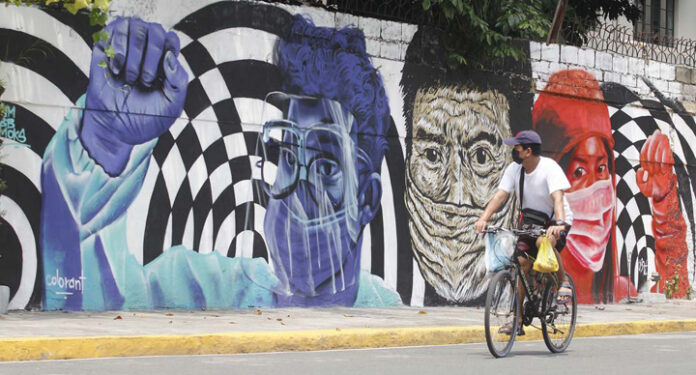
PLACING Metro Manila under General Community Quarantine (GCQ) at this time may not be ideal given the surge in Covid-19 cases, according to local economists.
On Monday morning, the Palace announced the decision of the Inter-Agency Task Force for the Management of Emerging Infectious Diseases
(IATF-EID) to place Metro Manila under GCQ, the least restrictive quarantine level.
In the afternoon of the same day, the Department of Health (DOH) announced that the country registered another record high of daily Covid-19 cases pegged at 22,415 cases.
“No, it’s not [the right time to ease restrictions]. The relaxation should come with tangible improvements, which I and many others do not see. Opposite pa nga ang nangyayari eh [what even happened was the opposite],” Ateneo Center for Research and Development (ACERD) Associate Director Ser Percival K. Peña-Reyes told the BusinessMirror.
Peña-Reyes said easing restrictions must be done in parallel with vaccination. However, he lamented that many still do not want to get vaccinated because they fear that they might die because of it.
He hoped the government would adopt a more proactive approach in persuading Filipinos to get vaccinated. As it is, many Filipinos become victims of “misinformation and fear-mongering” which he said will hurt the economy even more.
Peña-Reyes also expressed his doubts that the GCQ can boost the economy given the recent surge. He said the impact of the surge on the economy is “too big to play down.”
Given these conditions, it is likely that the economy may stay in negative territory this quarter and, possibly, in the full year, he said.
“I hope the government can adopt a more proactive and missionary mindset in its vaccination efforts. Go to villages. Get people to sign up for vaccination. Run infomercials more frequently. Assure people that they will not die because of vaccines,” he stressed.
For one, BPI chief economist Emilio S. Neri noted that before loosening restrictions, it was important to look at how many seniors are already vaccinated in Metro Manila.
Neri said if 85 percent of the senior citizens in the National Capital Region (NCR) are vaccinated, this will not lead to more deaths if the government loosens restrictions.
This is why other economists such as former Dean of the Ateneo de Manila School of Social Sciences Fernando T. Aldaba said greater effort must be placed on testing and contact tracing.
He also recommended that the government put up more vaccination stations along with the implementation of the supply management and distribution of vaccines.
UnionBank Chief Economist Ruben Carlo Asuncion added that without these, the government may also be throwing away any gains from the last ECQ and MECQ.
These, along with efforts to control the spread of the virus, are important considerations in loosening quarantine restrictions.
De La Salle University economist Maria Ella Oplas added that even if the government eased mobility restrictions, this is not a guarantee that more people will troop to business establishments to spend.
Oplas said a lot of people are scared about the Delta variant because it does not only infect adults but also children.
“It is sad because many people who can’t work from home are taking so many risks going out to earn incomes. Economic recovery will be slow and gradual given how we are managing our health response,” Aldaba told BusinessMithe on Monday.
Granulars backed
Meanwhile, Socioeconomic Planning Secretary Karl Chua said the National Economic and Development Authority (Neda) supported the move toward granular lockdowns to manage the risks.
This, Chua said, would allow the bigger majority to earn a living. This will be done along with efforts to accelerate the government’s vaccination program which will improve confidence.
For University of Asia and the Pacific Dean Cid L. Terosa, placing NCR under GCQ may allow the government to test the measures that it has taken so far.
Terosa said easing mobility restrictions will “boost production and infuse economic momentum” in Metro Manila, which was among the most affected by the lockdowns.
Ateneo de Manila University John Gokongwei School of Management Dean Luis F. Dumlao noted that a partial reopening of the economy is equivalent to activating one-third of it.
“While many might consider the imposition of GCQ premature, I think it is a test of whether all the measures we have taken so far are good enough to prevent the situation from worsening despite the GCQ,” Terosa said.
On Sunday, the DOH recorded its third consecutive posting of over 20,000 new Covid-19 cases. The total number of infections then stood at 2,080,984.
Image courtesy of Roy Domingo
Read full article on BusinessMirror

